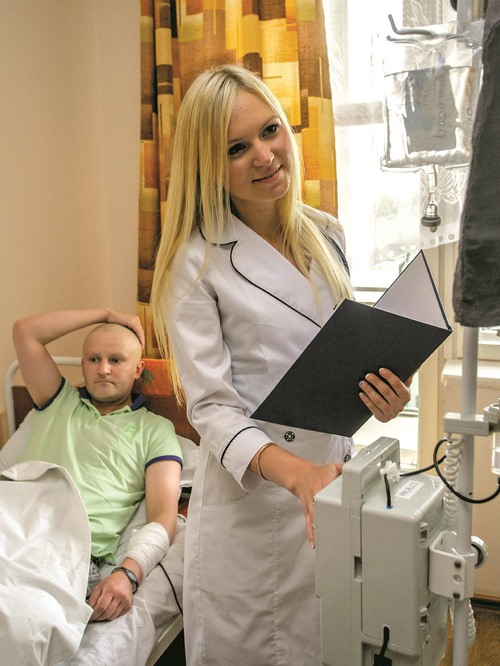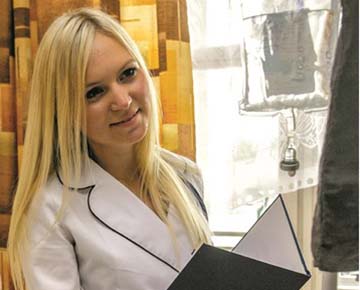Patients call this nurse, from Minsk City Clinical Oncology Treatment Centre’s Chemical Therapy Department number 1, the most cheerful lady they’ve ever met. The graduate of the Belarusian State Medical University’s Paediatrics Department, Yulia Kitel, approaches life with a smile. In August, the young specialist is to start her first job at Borovlyany’s Republican Scientific-Practical Oncology Centre.

Oncologist-doctor Yulia Kitel. Photo Vladimir Shlapak
On hearing the word oncology, many people’s hearts sink. This is Yulia’s favourite topic however, and her raison d’etre. She is afraid of nothing and has a fascination with chronic illness. “It wouldn’t have been as interesting for me to work at a policlinic, treating gastric problems or bronchitis. I appreciate not only the struggle against a disease but the fight for life, where patients need not only medical treatment but also moral support.”
Yulia decided to become a doctor in early childhood, sharing her dream at a kindergarten party. At school, she had already decided to become an oncologist. Yulia’s family attempted to dissuade her, saying that the profession is unsuitable for a young girl. They were not able to influence Yulia’s decision and, during her second year at university (when working on her oncology paper) she became convinced that she had made the right decision. She completed several other relevant courses, including some at Moscow’s oncology school. She participated in numerous congresses and conferences and received awards for her scientific papers.
As much as theoretical knowledge matters, practical experience is much more important. With this in mind, Yulia began her career as a nurse. She admits it was difficult at first: she took on her patient’s problems as her own. “Among my patients was a professor suffering from pancreatic cancer. It’s one of the most progressive types of tumour, which can kill a patient in under a year,” she recollects. “The man was very interesting to talk to and a personality. We became friends. Sadly, the time came when the treatment produced no respite and it was upsetting to realise that we would never see each other again.” It made her understood that her profession requires distance: the line should not be crossed. It’s possible to make friends with patients but they should not be allowed into your heart. Otherwise, it’s impossible to treat them efficiently. Of course, there have been cases of miraculous recoveries and patients come back to say thank you and share their news.
“I’ve not yet chosen the specific field to concentrate on in my work,” Yulia says. “Most likely this will be positron emission tomography, one of the most perfect methods of diagnostics making it possible to detect cancer before its clinical signs. The earlier we learn of a problem, the more chance we have to treat it.” Miss Kitel is grateful to her university for the knowledge she’s gained. She is also grateful to the lecturers. “I remember our pathology physiology teacher well,” the young specialist says. “I was impressed by the dignity he demonstrated when communicating with a mentally ill student. I try to behave in a similar way.”
Yulia cannot say whether she sees her work moving into other areas than medicine. She has no other areas of interest in her life. Of course, she has artistic hobbies: since her first year at the University, she has taken part in concerts and theatrical performances. Yulia also loves foreign languages. She has no doubts however, that she has chosen the right career path and affirms, “I love to help people.”
By Yekaterina Panteleeva











